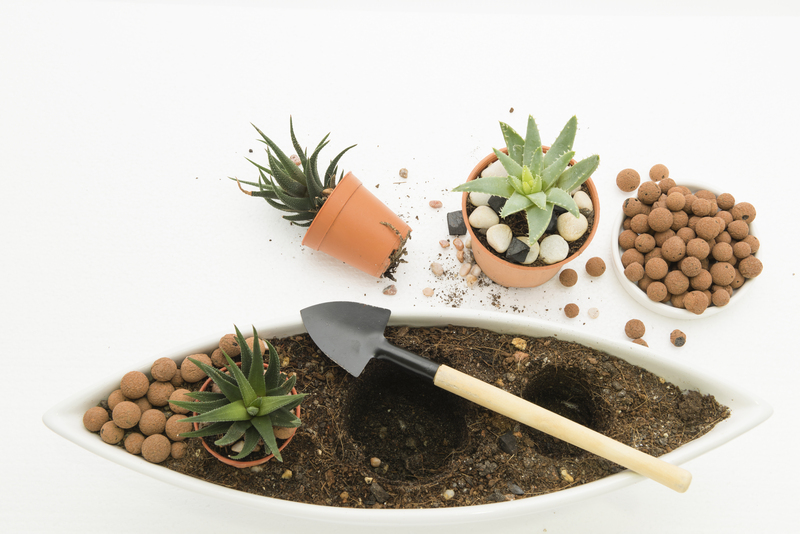Organic Waste Repurposed as Garden Fuel
Posted on 03/06/2025
Organic Waste Repurposed as Garden Fuel: A Comprehensive Guide
Organic waste is often seen as a byproduct of kitchens, gardens, and agricultural activities, and it usually ends up in landfills. However, with the rise of sustainable gardening practices, repurposing organic waste as garden fuel has become a practical and eco-friendly solution. This article explores the various methods of turning organic waste into valuable garden fuel, the environmental benefits, step-by-step guides, and essential tips for successful implementation. Let's discover how you can transform your waste into a resource, creating a thriving, fuel-efficient garden ecosystem.

Understanding Organic Waste
What Is Organic Waste?
Organic waste consists of natural, biodegradable materials derived from plants or animals. Examples include:
- Food scraps (vegetable peels, fruit rinds, coffee grounds, eggshells)
- Yard waste (grass clippings, leaves, branches, trimmings)
- Paper products (uncoated paper towels, napkins, newspaper)
- Manure from herbivorous animals
These materials break down naturally and can be repurposed as garden fuel to boost plant health and productivity.
Why Repurpose Organic Waste?
Traditional waste disposal methods fill up landfills, increase greenhouse gas emissions, and underutilize potentially valuable resources. By repurposing organic waste as fuel for the garden, homeowners and gardeners can:
- Reduce landfill waste
- Enrich soil fertility
- Save money on fertilizers and fuel
- Encourage sustainable gardening practices
- Lower carbon footprint
Methods of Turning Organic Waste into Garden Fuel
1. Composting: Nature's Powerhouse
Composting is one of the most popular ways to repurpose kitchen and garden waste as fuel for future plant growth. Compost is often referred to as "black gold" because it is rich in nutrients and microbes essential for healthy gardens.
How to Compost
- Choose a compost bin: Select a suitable bin or pile location with good drainage and exposure to air.
- Add organic waste: Alternate between 'green' materials (food scraps, grass clippings) and 'brown' materials (dead leaves, cardboard).
- Maintain moisture: Keep the compost pile damp, like a wrung-out sponge.
- Aerate regularly: Turn the pile every 2-4 weeks to supply oxygen for decomposition.
- Wait for maturity: Compost is ready when it's crumbly, dark, and smells earthy. Use it as a top dressing or dig it into garden beds.
Composting turns waste into an organic garden fuel that feeds soil life and plants alike.
2. Anaerobic Digestion: Biogas for Garden Heating
Anaerobic digestion is the process by which microorganisms break down organic material in the absence of oxygen. This method produces biogas--a mix of methane and carbon dioxide--that can be used to fuel garden heaters, greenhouses, or even cooking equipment.
Steps to Set Up a Home Biogas System
- Install an anaerobic digester: Commercial kits or DIY systems are available in various sizes.
- Add organic waste: Feed kitchen scraps, manures, and green waste into the digester.
- Collect biogas: Capture the gas produced in storage tanks for later use.
- Use the byproduct: The leftover sludge can be used as a potent fertilizer for gardens.
Biogas is an effective example of utilizing organic waste as garden fuel for both heating and nutrient cycling.
3. Vermicomposting: Worms Powering Your Garden
Vermicomposting uses earthworms to break down organic matter. The result is worm castings--a nutrient-rich product that acts as a slow-release fertilizer and soil conditioner.
Setting Up a Worm Bin
- Choose a shallow, wide bin with drainage holes
- Add bedding material (shredded paper, cardboard, coconut coir)
- Introduce red wigglers or European nightcrawlers
- Feed with kitchen scraps (avoid meat, dairy, and oily foods)
- Harvest worm castings every 2-3 months and apply to your plants
Worm castings act as an outstanding organic garden fuel, promoting root growth and soil structure.
4. Biochar: Fuel, Soil Amendment, and Carbon Sink
Biochar is a form of charcoal made by burning organic waste in a low-oxygen environment (a process known as pyrolysis). It has a unique porous structure, making it an excellent soil amendment and carbon sink.
Making Biochar at Home
- Gather dry garden waste (prunings, wood chips, twigs)
- Burn in a specially designed kiln or pit to limit oxygen
- Cool and crush the resulting char
- Mix with compost or soak in compost tea before applying to soil
Biochar improves nutrient retention, water holding, and acts as long-lasting garden fuel for healthier soils.
5. Mulching: Direct Use of Organic Waste as Fuel
Mulching involves spreading organic waste directly on the soil surface. Materials such as grass clippings, leaf litter, shredded paper, and wood chips act as fuel for soil microbes and slow-release fertilizers for plants.
Benefits of Mulching
- Suppresses weeds and reduces evaporation
- Keeps soil temperatures stable
- Adds organic matter as mulch decomposes
- Enhances soil fertility naturally
Mulching is a simple strategy for repurposing organic waste as fuel in the garden--with minimal processing required.
Environmental Benefits of Repurposing Organic Waste
Reducing Landfill Waste
Landfills produce methane, a highly potent greenhouse gas. By converting organic waste into garden fuel, you directly diminish landfill contributions, effectively supporting a sustainable environment.
Lowering Carbon Footprint
By using less synthetic fertilizer and fuel, gardens that recycle organic waste as fuel lower their carbon emissions and promote a circular economy.
Conserving Resources
Composting, mulching, and biogas production turn waste into useable fuel and fertilizer, saving natural resources and reducing the demand for chemical products.
Enhancing Soil Health and Biodiversity
Rich, organic soils foster beneficial microbial life, which boosts plant growth and natural pest resistance. Improved soil structure and water retention also follow, leading to healthier, more resilient gardens.
Practical Tips for Repurposing Organic Waste as Garden Fuel
What to Use and What to Avoid
- Use: Fruit and veggie scraps, coffee grounds, tea leaves, paper, plant material, eggshells, grass clippings, leaves, animal manures from herbivores
- Avoid: Meat, dairy, oily foods, diseased plants, glossy paper, pet feces, large woody branches unless chipped
Using the appropriate waste ensures safe and efficient breakdown, while avoiding toxins or odors.
Balancing Green and Brown Materials
For composting and mulching, balance green materials (high in nitrogen) with brown materials (high in carbon) for an efficient breakdown. A general rule is 2 parts brown to 1 part green.
Small Steps for Big Impact
- Start small: Use what you have, whether a bucket for composting kitchen waste or leaves for mulch.
- Educate family and neighbors: Share the benefits of organic waste reuse as garden fuel.
- Troubleshooting: If you experience odor, pests, or slow decomposition, adjust the brown/green balance, add more air, or chop materials smaller.
Advanced Ways to Harness Organic Waste for Garden Energy
Mini Biogas Generators for Home Gardens
Recent technological advances make it possible to have small-scale biogas units that can power garden lighting or heaters. These systems use excess kitchen and garden waste, providing a self-sustaining renewable energy source for avid gardeners.
Solar Composters
Some compost bins use solar energy to heat up the waste, speeding decomposition and making more fuel for the garden in less time. Paired with traditional composting techniques, solar composters are highly efficient and eco-friendly.
The Economic Case for Turning Organic Waste into Garden Fuel
Saving Money on Fertilizers and Fuel
Organic fertilizers, soil amendments, and biogas can be costly. By repurposing your own organic waste, you can drastically cut down on expenses while enhancing your garden's productivity.
Boosting Garden Yields
Soil enriched with compost, worm castings, or biochar produces more vigorous, resilient crops, increasing your harvest and potentially saving money on food.
Unlocking Free Resource Streams
Consider partnering with local coffee shops, restaurants, or neighbors for additional organic waste--transforming it into abundant garden fuel and even sharing the bounty!

Challenges to Consider When Using Organic Waste as Garden Fuel
Pest Management
Improperly managed organic waste can attract pests. Prevent this by:
- Covering compost piles with browns or finished compost
- Never adding meat, dairy, or cooked food
- Using closed bins in urban areas
Time and Labor
Turning waste into garden energy takes some effort. Regular maintenance, turning, and monitoring are key to a smooth, odor-free process. Involve family members or neighbors to share the tasks and the rewards.
Weather and Space Constraints
Gardeners with limited space can still utilize bokashi bins (compact fermentation systems) or vermicomposting indoors--perfect for apartments or winter months.
Conclusion: A Greener Future with Organic Waste Repurposed as Garden Fuel
Repurposing organic waste as garden fuel is a practical, eco-conscious strategy that benefits your garden, your wallet, and the wider environment. Whether through composting, vermicomposting, mulching, biogas, or biochar, there is a solution for every gardener interested in renewable energy and sustainable growth.
By embracing organic waste recycling, you are not only reducing your ecological footprint but also transforming your garden into a lush, productive, and resilient ecosystem. Start today--with small steps or ambitious systems--and discover the powerful rewards of turning waste into valuable fuel for your plants and the planet.
Frequently Asked Questions: Organic Waste Fuel for Gardens
- Can I use cooked food in my compost?
No, cooked food attracts pests and may disrupt compost balance. - How long does compost take to mature?
Typically 3-12 months, depending on materials and conditions. - Is biogas safe for home use?
Yes, if produced with proper equipment and precautions. - Do I need special equipment?
For basic composting or mulching, no. Anaerobic digesters and biochar kilns may require investment. - What is the best method for small spaces?
Vermicomposting or bokashi bins are ideal for apartments or limited areas.
Take Action: Transform Waste, Fuel Your Garden, and Grow Sustainably!
Start today by separating your organic waste, choosing a repurposing method that fits your space and needs, and watch your garden flourish with the nourishing fuel nature provides!

